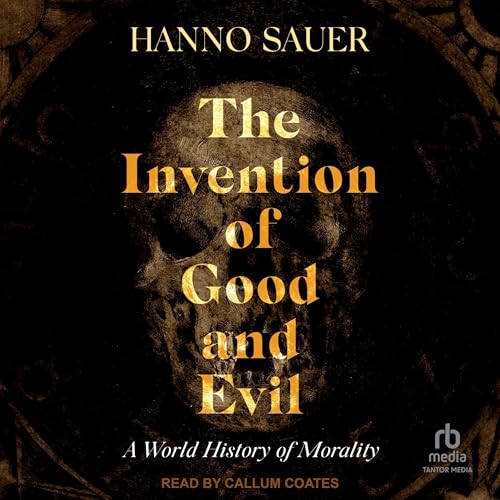
The Invention of Good and Evil
A World History of Morality
Failed to add items
Add to Cart failed.
Add to Wish List failed.
Remove from wishlist failed.
Adding to library failed
Follow podcast failed
Unfollow podcast failed
 Prime members: New to Audible?
Prime members: New to Audible?Get 2 free audiobooks during trial.
Buy for $21.94
-
Narrated by:
-
Callum Coates
-
By:
-
Hanno Sauer
What makes us moral beings? How do we decide what is good and what is evil? And has it always been that way? Hanno Sauer's sweeping new history of humanity, covering five million years of our universal moral values, comes at a crucial moment of crisis for those values, and helps to explain how they arose—and why we need them.
Modern societies are in crisis: a shared universal morality seems to be a thing of the past. Hanno Sauer explains why this appearance is deceptive: in fact, there are universal values that all people share. If we understand the origin of our morality, we can understand its future too.
Sauer explains how processes of biological, cultural, social, and historical evolution shaped the moral grammar that defines our present. Seven chapters recount the crucial moral upheavals of human history showing how the emergence of humankind five million years ago, the rise of first civilizations 5,000 years ago, and the dynamics of moral progress in the last fifty years are interrelated. This genealogical perspective allows us, on the one hand, to see the contradictions and potential conflicts of our moral identities; on the other, it makes clear that we share fundamental values that apply to all human beings at all times. Sauer's elegant prose brings the history of humanity to vivid new life.
©2023 Hanno Sauer; Translation copyright 2024 by Jo Heinrich; copyright 2024 by Oxford University Press (P)2024 TantorListeners also enjoyed...




















People who viewed this also viewed...










the sheer scope of the book.
Something went wrong. Please try again in a few minutes.
Understanding how morality develops, why it varies so widely from culture to culture and why there can be no universal or objective morality are all important topics for discussion, but Sauer only addresses the first of these issues. Here Sauer is on target in noting that morality arises from the simple fact that humans are social animals. We must cooperate to survive and thus we need behavioral rules. That much is indisputable. But Sauer barely touches on the fact that morality evolves within different groups and cultures in very different ways. Some cultures require women to be covered from head to toe, prohibited from working outside the home and hand out the death penalty for adultery or blasphemy. Other cultures encourage nude beaches, disco dancing and drug and alcohol use. Some cultures are religiously governed, others completely secular and the moral standards in every culture are quite different. Of course there are some similarities between cultures because all human groups want to minimize violence and maximize safety and productivity. But they may take very different moral approaches to these issues.
Because what is considered good or bad varies so widely based on cultural context, it is obvious there can be no such thing as objective or universal morality. People from different cultures are different and social values differ not only from group to group but from individual to individual. Yet Sauer, relying on widely criticized leftist anthropologists, Wengrow and Graeber, claims that original human hunter gatherer societies were utopias of egalitarianism and further that such unproven hunter/gatherer equality is the natural state of human society. There its absolutely no evidence for this and it has never been true in the last 5000 years. Sauer admits there would have been alpha males in such primitive hunter/gatherer societies, but then argues that they would have been conveniently killed off, so that humanity would have eliminated its alpha male problem by eliminating those alpha male genes. Gosh, I wonder where Stalin, Hitler, Trump, Mao and Putin came from? We still seem to have this alpha male gene problem throughout the history of civilization.
Having put his foot on the scale for radical egalitarianism, Sauer then spends the last part of the book lecturing us on the moral correctness of wokeness, effective altruism, critical race theory, and all the other once trendy leftist academic, anti-free-market ideologies. This is done under the guise of explaining how morality evolves. Moral standards within a culture are of course always changing, but making a value judgment that the woke development is getting better undermines Sauer's supposedly scientific approach to his topic. Unless universal morality exists Sauer has no basis for comparison to say whether leftist wokeism constitutes moral progress or moral deterioration. One would imagine that he views these moral developments as a response to living in a broader more complex society. But of course we just had a US election where those moral values were resoundingly rejected. Presumably Sauer would not consider that to be moral progress.
In any case the book holds itself out as a history of moral development but quicklyy becomes a leftist political tract of little interest that no one needs to read.
An insidiously bad book on "good" and "evil"
Something went wrong. Please try again in a few minutes.
Was good until author got political
Something went wrong. Please try again in a few minutes.


